Introduction
In the realm of clinical research, specialized regional trial services have emerged as a vital component in navigating the complexities of diverse populations and geographical challenges. Particularly in Latin America, where Medtech companies encounter a myriad of obstacles—from regulatory intricacies to cultural nuances—these services provide tailored solutions that enhance the efficacy of clinical trials.
The integration of local expertise not only streamlines processes such as patient recruitment and regulatory compliance but also fosters meaningful collaborations that drive innovation. As the landscape of clinical research continues to evolve, understanding the significance of these specialized services is paramount for researchers aiming to improve trial outcomes and ultimately, patient care.
Introduction to Specialized Regional Trial Services
Specialized Regional Trial Services play a vital role in modern medical research by providing customized solutions that meet the unique needs of particular groups and geographic areas. This is particularly pertinent in Latin America, where Medtech companies face various challenges, including:
- Regulatory hurdles
- Professionalism issues
- Language barriers
- Fragmented resources due to the lack of established CRO structures
Since January 1, 2015, the submission of medical data to the EMA has been a regulatory necessity, highlighting the significance of these specialized offerings in ensuring compliance.
Partnerships such as that between Greenlight Guru and bioaccess™ are crucial in connecting innovation and implementation, enabling quicker market entry for medical devices through effective testing. These offerings are meticulously designed to enhance the research process, focusing on critical aspects such as:
- Patient recruitment
- Regulatory compliance
- Data management
By utilizing local knowledge and resources, specialized evaluation services greatly enhance the quality and pertinence of research across various environments.
For example, bioaccess®'s dedication to delivering quick, economical, and high-quality research data ensures that Medtech startups can navigate the complexities of:
- Early-feasibility studies (EFS)
- First-in-human studies (FIH)
- Pivotal studies
Moreover, closing communication gaps between Latin American hospitals and American research clients is crucial for enhancing collaboration and results. As the environment of medical research keeps changing, especially with the expected advancements in 2024, understanding the importance of Specialized Regional Trial Services becomes crucial for researchers dedicated to enhancing study effectiveness and relevance, ultimately resulting in better patient outcomes.
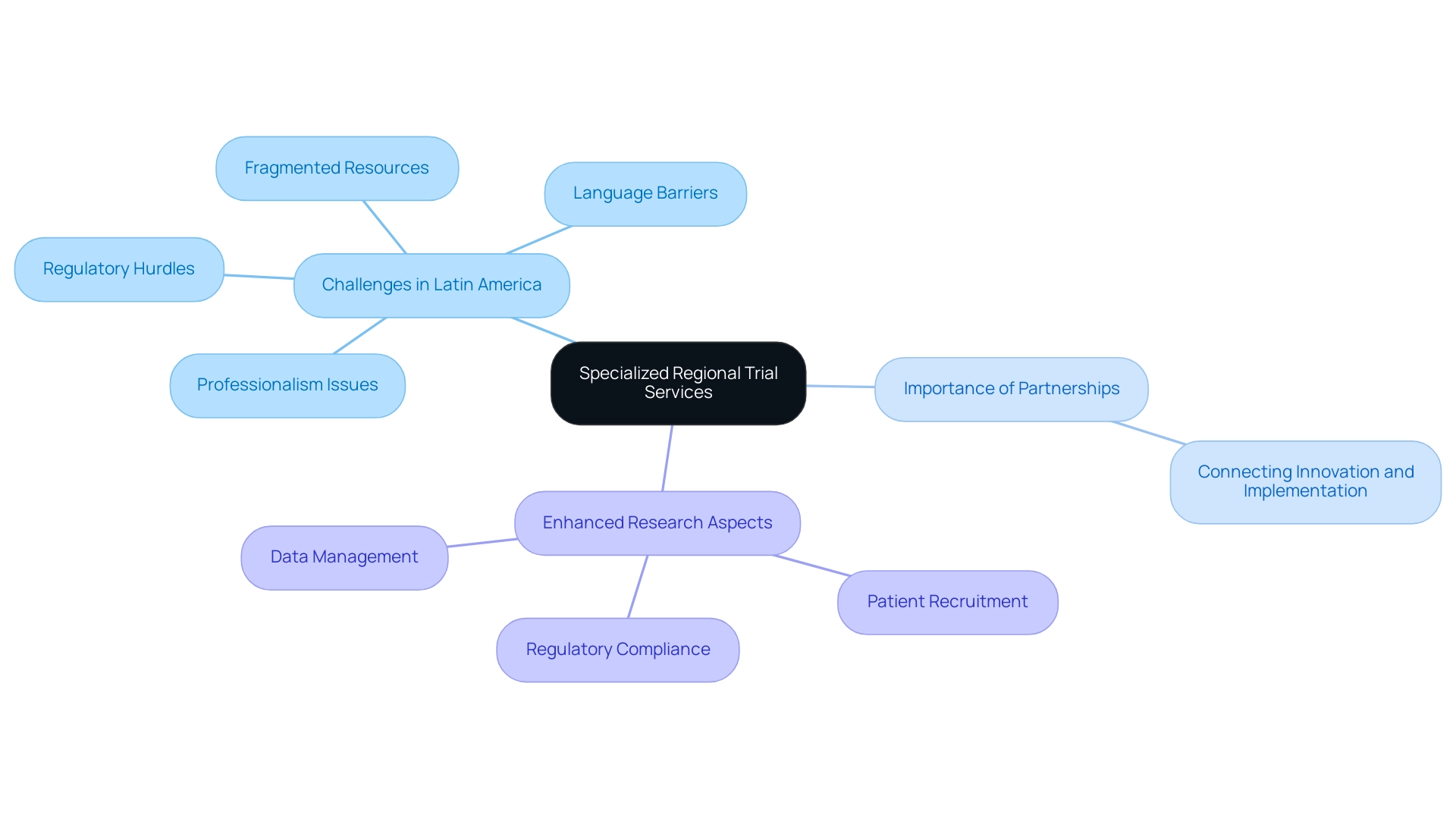
Key Services Provided by Specialized Trial Services
Specialized regional testing options provide a comprehensive range of key offerings that are essential for enhancing research outcomes:
- Patient Recruitment and Retention: Utilizing localized strategies, these programs concentrate on engaging potential participants to ensure a diverse and representative sample for studies. Techniques such as community outreach and partnerships with local healthcare providers are instrumental in enhancing recruitment effectiveness. Recent collaborations, such as between bioaccess™ and Caribbean Health Group, have demonstrated a commitment to improving recruitment processes in Colombia, resulting in over a 50% reduction in recruitment time and a retention rate exceeding 95%. This trend showcases various methods and perceptions that lead to positive outcomes, reinforcing the importance of effective recruitment strategies.
- Regulatory Compliance Assistance: Specialized research offerings are equipped with expertise to navigate the intricate regulatory environments that oversee scientific inquiry in Colombia. By ensuring adherence to both local and international guidelines, these services minimize the risk of non-compliance, a critical concern for trial sponsors. The recent focus on regulatory speed in Colombia, with total IRB/EC and MoH (INVIMA) reviews taking only 90-120 days, underlines the importance of staying informed on compliance updates to maintain the integrity of clinical trials.
- Trial Set-Up and Start-Up Approvals: The process begins with obtaining project approval from the site's institutional review board (IRB)/ethics committee (EC) and the regulatory agency (INVIMA)/Ministry of Health (MoH). This involves making sure that all research documents adhere to local regulations, which is essential for successful project initiation.
- Bioanalytical Services: These encompass the development and validation of analytical methods for measuring biomarkers, pharmacokinetics, and other key parameters vital for assessing treatment efficacy. Precise bioanalytical techniques are essential for producing dependable data that backs research findings and improves overall study quality.
- Toxicology Services: Specialized providers conduct thorough toxicology assessments, which are essential for evaluating the safety profiles of investigational products. This guarantees that products adhere to strict safety criteria before advancing to subsequent stages of testing, thereby protecting participant well-being and conforming to Colombia's high-quality healthcare standards.
- Data Management and Statistical Analysis: These services facilitate the collection, management, and analysis of study data, ensuring accuracy and reliability in reporting results. This is crucial for meeting regulatory submission requirements and publishing findings in reputable journals, further contributing to the success of research initiatives.
- Reporting and Project Management: Ongoing oversight and documentation of research status, inventory, and adverse events are essential elements of medical research management. These offerings guarantee that all parties are kept updated and that the research advances as intended, tackling any problems that might occur swiftly.
By utilizing Specialized Regional Trial Services, researchers can greatly improve the quality and effectiveness of their medical experiments. This not only contributes to improved patient outcomes but also fosters a deeper understanding of medical advancements. As highlighted by specialists in the field, effective recruitment and regulatory compliance are essential for the success of research studies.
Ultimately, the integration of such services represents a strategic approach to overcoming common challenges in research execution, particularly in a competitive landscape like Colombia's.
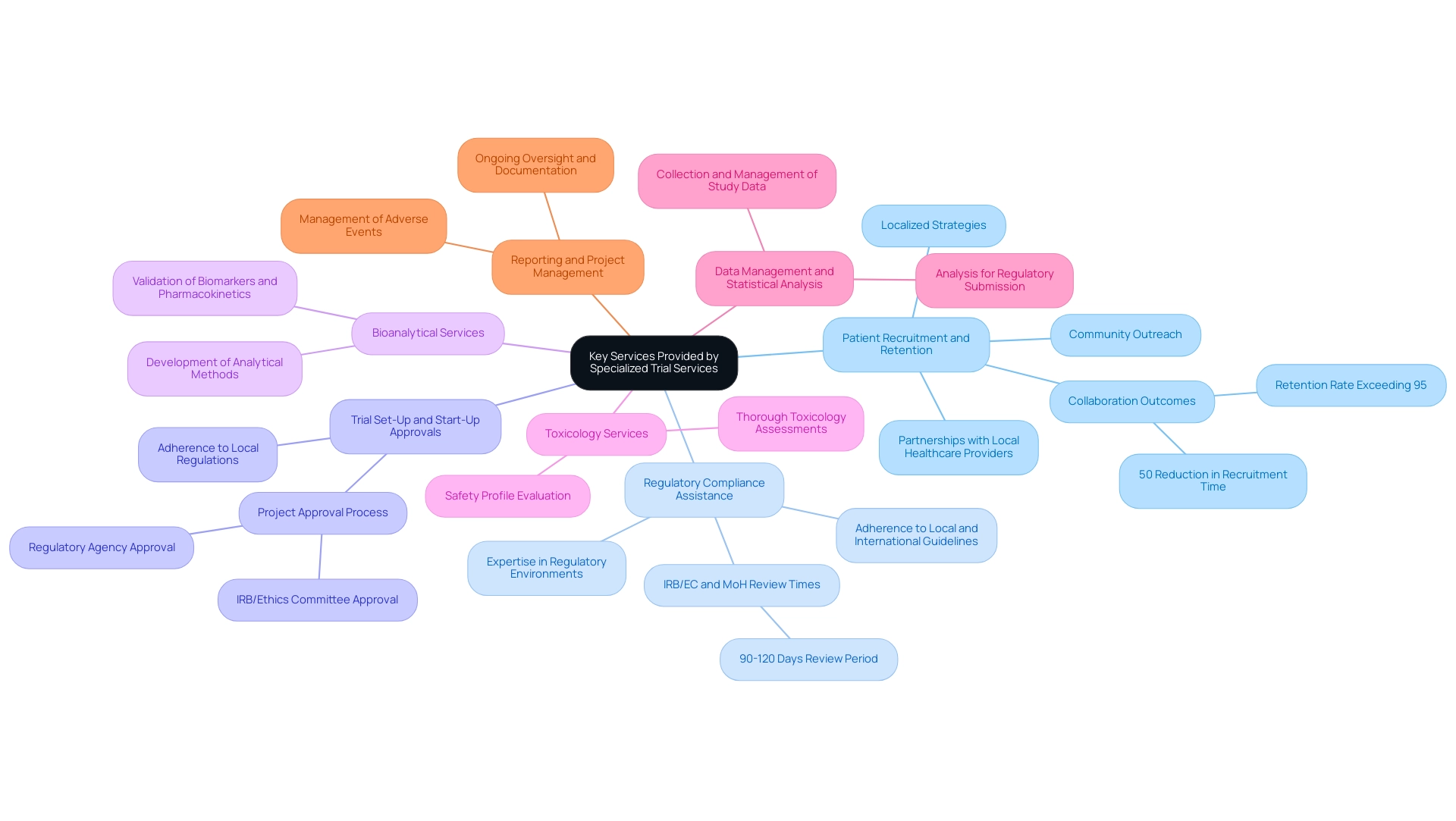
The Importance of Local Knowledge in Clinical Trials
Local knowledge plays a crucial role in the success of medical studies, as it equips researchers with insights into the cultural, social, and economic factors that influence patient behavior and perceptions. By understanding these dynamics, researchers can craft more effective communication strategies and recruitment efforts. Engaging local healthcare providers, for instance, not only fosters trust but also enhances participation rates.
Furthermore, awareness of region-specific health issues can inform the development of study protocols that resonate with the target population, leading to improved retention rates and more credible results. The recent partnership between bioaccess™ and Caribbean Health Group seeks to establish Barranquilla as the premier location for research studies in Latin America, illustrating how local collaborations can improve study effectiveness. Supported by Colombia's Minister of Health, this initiative is expected to create jobs and stimulate economic growth, thereby improving healthcare infrastructure in the region.
Furthermore, GlobalCare Clinical Trials’ collaboration with bioaccess™ demonstrates the potential for substantial enhancements in research studies, achieving over a 50% decrease in recruitment time and a 95% retention rate. This partnership also emphasizes thorough management offerings for research studies, encompassing feasibility assessments, compliance evaluations, study setup, and project oversight, which are crucial for handling the intricacies of medical research.
These developments emphasize the necessity of integrating local knowledge to navigate potential barriers effectively.
Researchers who prioritize these insights are better positioned to create collaborative environments that ultimately enhance study success, thereby contributing to the broader field of medical research and yielding economic benefits such as job creation and improved healthcare outcomes.
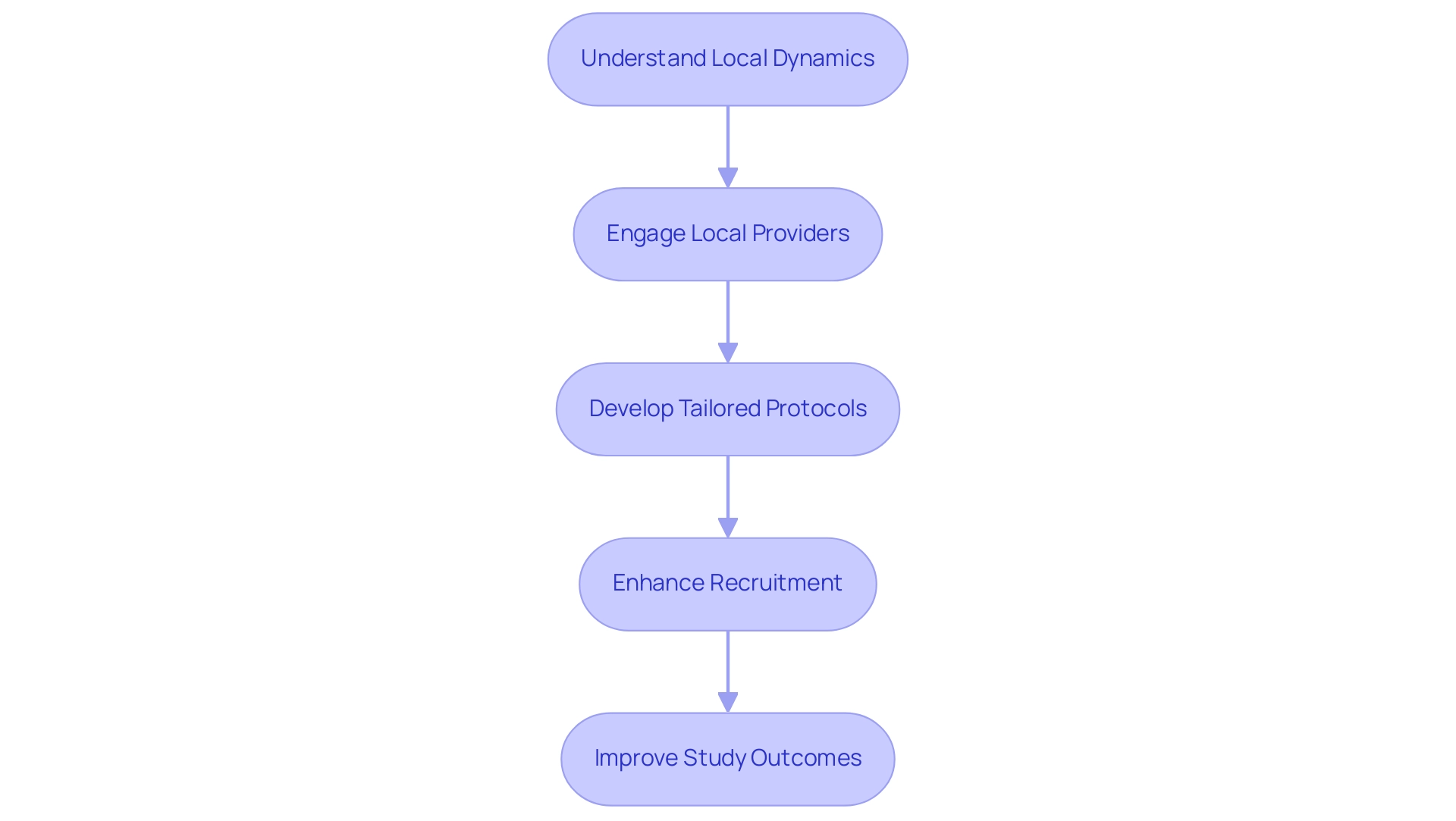
Challenges Faced by Specialized Regional Trial Services
While Specialized Regional Trial Services offer notable benefits, they also come with challenges that are essential for improving the overall effectiveness of research studies. Key challenges include:
-
Regulatory Variability: Regulatory requirements can differ significantly between regions, complicating the approval process for clinical studies.
Understanding these differences is essential for ensuring compliance. In Colombia, for instance, INVIMA (Instituto Nacional de Vigilancia de Medicamentos y Alimentos) serves as the regulatory authority overseeing health products, including medical devices, and is categorized as a Level 4 health authority by PAHO/WHO. This emphasizes the necessity for expertise in navigating these complex regulatory landscapes.
Recent trends indicate that nearly 900 dedicated biostatistics and programming staff have supported approximately 1,200 studies across various phases, highlighting the importance of specialized knowledge in addressing the variability in regulations, which can be a barrier to trial initiation and execution.
-
Resource Limitations: Specialized offerings often encounter constraints in funding, personnel, and technology, which can limit their operational capacity. Collaborating with local institutions may provide a strategic advantage, enabling these services to enhance their offerings despite resource challenges.
The availability of biostatistics staff can be a crucial resource in optimizing the use of limited funding and technology.
-
Cultural Barriers: Engaging patients from diverse backgrounds requires sensitivity to cultural nuances. Misunderstandings can impede patient recruitment and retention.
Therefore, training staff in cultural competence is essential to foster better communication and understanding.
-
Data Management Issues: Maintaining data integrity across multiple sites poses a significant challenge. Effective data management systems and regular audits are vital to ensure the quality and reliability of data.
Common biostatistical approaches such as descriptive analysis and survival analysis play a critical role in understanding the impact of interventions and patient characteristics on outcomes, thus aiding in robust data management practices. The expertise of professionals like Katherine Ruiz, a Regulatory Affairs specialist with a background in medical devices, further emphasizes the significance of biostatistics in research design and regulatory compliance. Her experience at INVIMA emphasizes how regulatory knowledge can influence the future of research trials.
Capabilities Integration: Tackling these challenges efficiently necessitates a thorough strategy for research management offerings, comprising feasibility assessments and site selection, study preparation, ethics committee approvals, and updates on study progress and adverse occurrences. By actively identifying and tackling these challenges, including the significance of randomization to reduce selection bias and enhance the reliability of results, researchers can significantly improve the effectiveness of Specialized Regional Trial Services, ultimately leading to more favorable health outcomes.
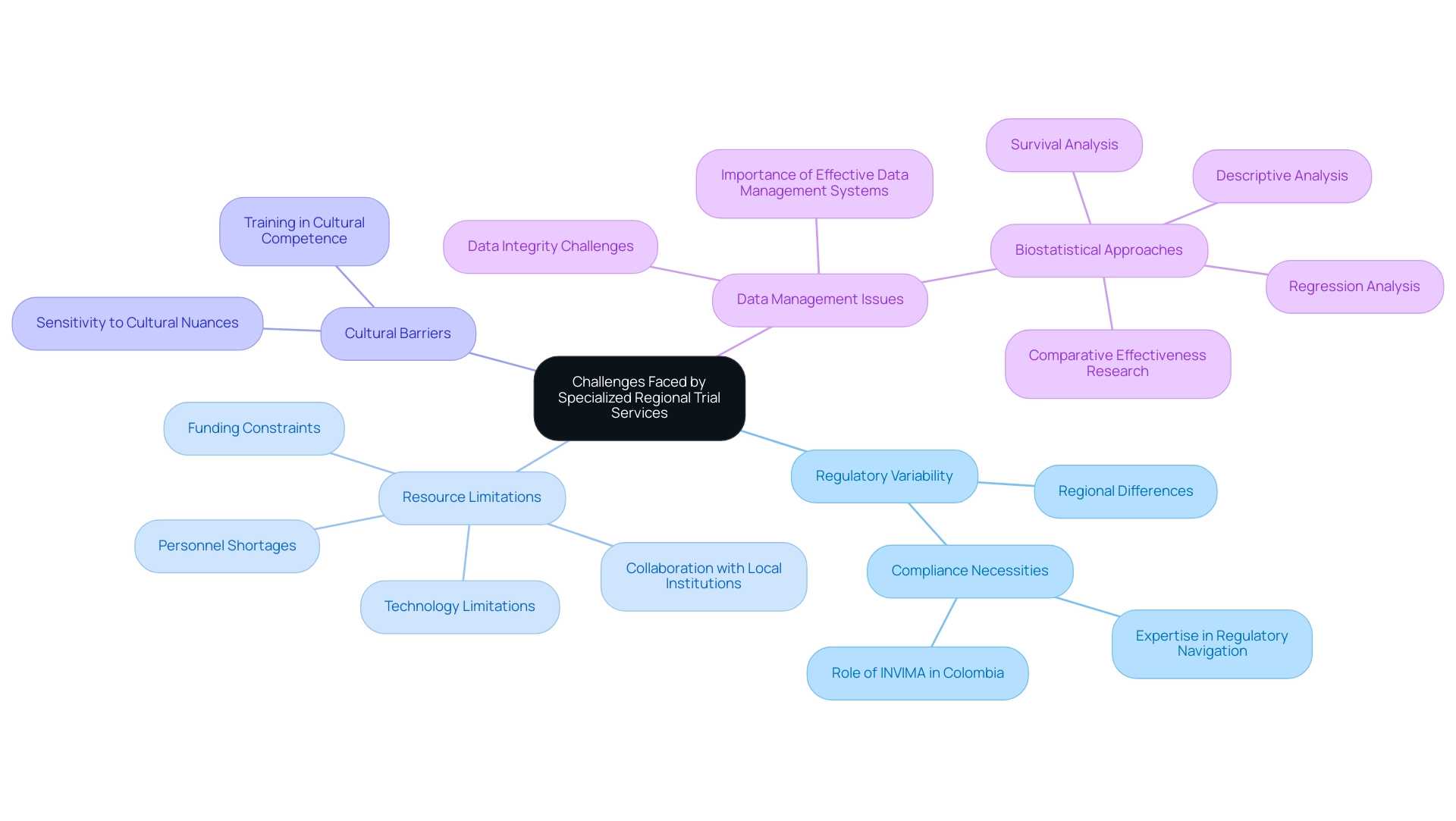
Future Trends in Specialized Regional Trial Services
The landscape of Specialized Regional Trial Services is rapidly evolving, driven by technological advancements, regulatory updates, and shifting patient demographics. Key trends that are emerging include:
- Increased Use of Telemedicine: The integration of telemedicine into healthcare studies is transforming patient engagement and accessibility. Remote monitoring and virtual consultations not only facilitate participation but also help maintain ongoing patient relationships, thereby enhancing retention rates.
- Data Analytics and AI: The utilization of big data and artificial intelligence is transforming clinical study management. These technologies streamline patient recruitment processes, enhance data analysis capabilities, and improve decision-making efficiency, ultimately contributing to quicker and more effective study outcomes. As noted by Dr. Khair ElZarrad from the FDA, "We plan on developing and adapting a flexible risk-based regulatory framework that will promote innovation and protect patient safety." This highlights the importance of these tools in fostering responsible drug development, especially as the FDA actively engages with stakeholders to shape the future of drug development through initiatives that promote innovation while ensuring patient safety.
- Patient-Centric Approaches: There is a marked shift towards patient-centric study designs, emphasizing tailored protocols that prioritize the needs and preferences of participants. This method not only boosts patient satisfaction but also increases retention rates by making studies more attractive and accessible to participants.
- Global Collaboration: As medical research becomes more worldwide, the significance of cooperation among international locations and specialized support, such as those offered by bioaccess®, cannot be overstated. Their expertise in conducting Early-Feasibility, First-In-Human, Pilot, Pivotal, and Post-Market Follow-Up Studies, supported by Specialized Regional Trial Services, is pivotal in addressing the diverse needs of patients across different regions while navigating varying regulatory landscapes. Furthermore, bioaccess® provides extensive services such as feasibility studies, site selection, compliance evaluations, setup, import permits, project management, and reporting. These collaborations not only drive innovation in Medtech but also contribute to job creation and economic growth in local economies.
Furthermore, it is crucial to acknowledge the challenges encountered by Medtech firms in Latin America, such as regulatory obstacles and resource fragmentation, which can impede effective communication and cooperation with American research clients. Tackling these challenges is essential for closing the gaps in medical research and ensuring successful outcomes.
By staying aligned with these trends and utilizing extensive clinical research management resources, researchers can effectively adjust their strategies and methodologies, ensuring the success of their clinical studies in a constantly changing environment.
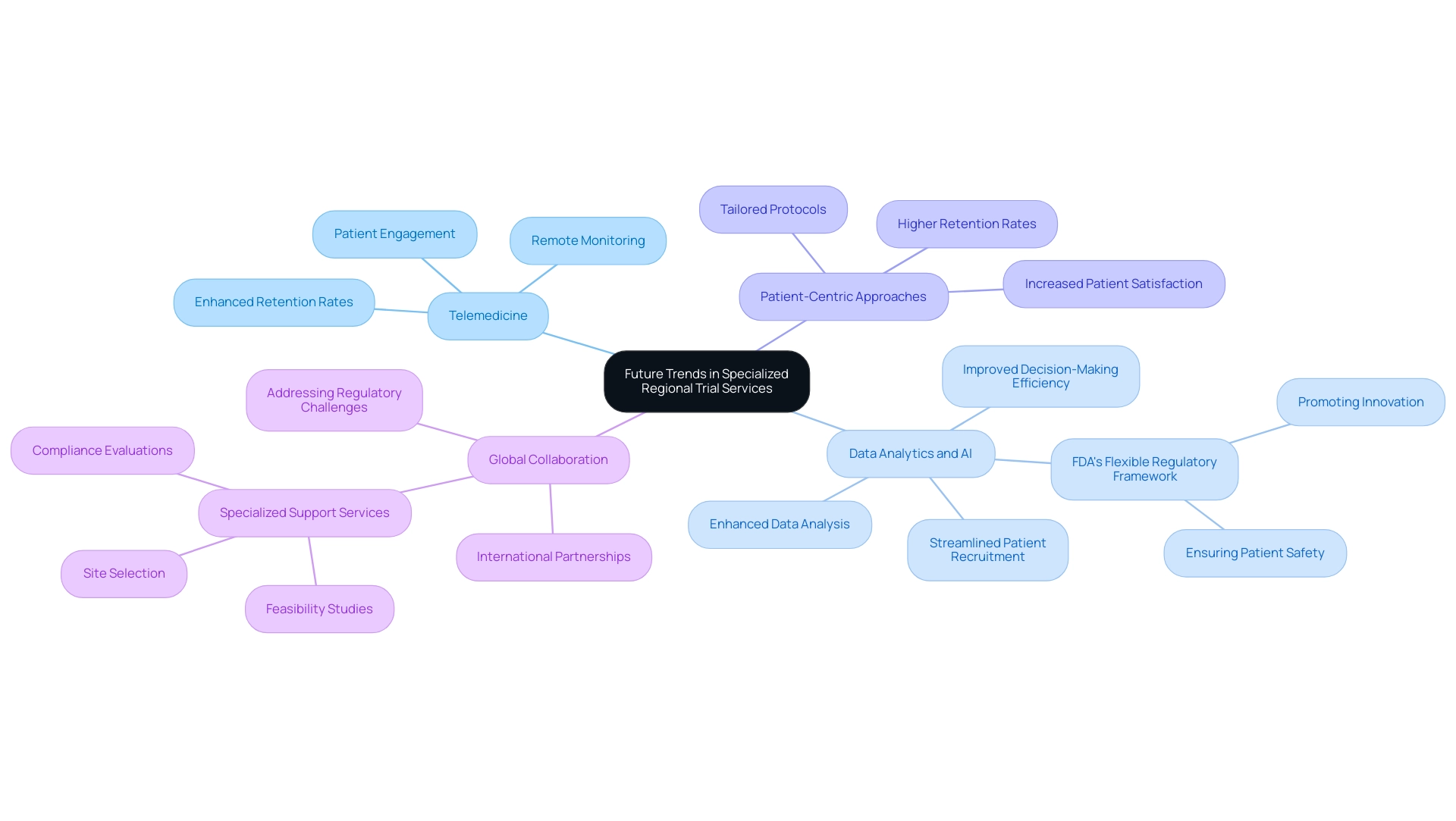
Best Practices for Engaging with Specialized Regional Trial Services
To fully utilize the benefits provided by specialized local testing options, researchers should adopt the following best practices:
- Establish Clear Communication: It is crucial to cultivate open and transparent communication channels with service providers, such as bioaccess®, which boasts over 20 years of Medtech expertise. This ensures that expectations are clearly defined, and any potential issues can be swiftly addressed, thereby minimizing disruptions. As highlighted in the Institute of Medicine's report, effective communication is essential for maximizing the benefits of clinical research data sharing while minimizing associated risks.
- Build Collaborative Relationships: Forming strong partnerships with local stakeholders—including healthcare providers and regulatory bodies like INVIMA—can significantly enhance recruitment efforts and ensure compliance with trial protocols. INVIMA's role as a Level 4 health authority, overseeing the marketing and manufacturing of medical devices, underscores the importance of these collaborations. Such relationships are crucial for cultivating a supportive research environment and are necessary for responsible data sharing, as shown in the case analysis 'Sharing Clinical Trial Data,' which demonstrates how such partnerships can speed up discoveries and improve scientific knowledge.
- Leverage Local Expertise: Tapping into the knowledge and insights of local experts can greatly inform research design and execution. At bioaccess®, we highlight the significance of feasibility studies and site selection to ensure that protocols are culturally sensitive and pertinent to the target population, ultimately enhancing participant engagement and retention. Additionally, our team conducts compliance reviews and setup processes to ensure all regulatory requirements are met seamlessly.
- Invest in Training: Continuous training for research personnel centered on best practices for interacting with specialized resources is crucial. By enhancing staff capabilities, researchers can improve collaboration and operational efficiency. bioaccess® offers extensive project oversight and supervision, featuring regular updates on study status, inventory management, and monitoring of serious and non-serious adverse events, to support these training initiatives.
By implementing these strategies, research teams can improve their interactions with Specialized Regional Trial Services, thereby enhancing the quality and outcomes of their medical studies. As emphasized by the Institute of Medicine, responsible sharing of clinical trial data strengthens the evidence base for regulatory and clinical decisions and benefits future research endeavors.
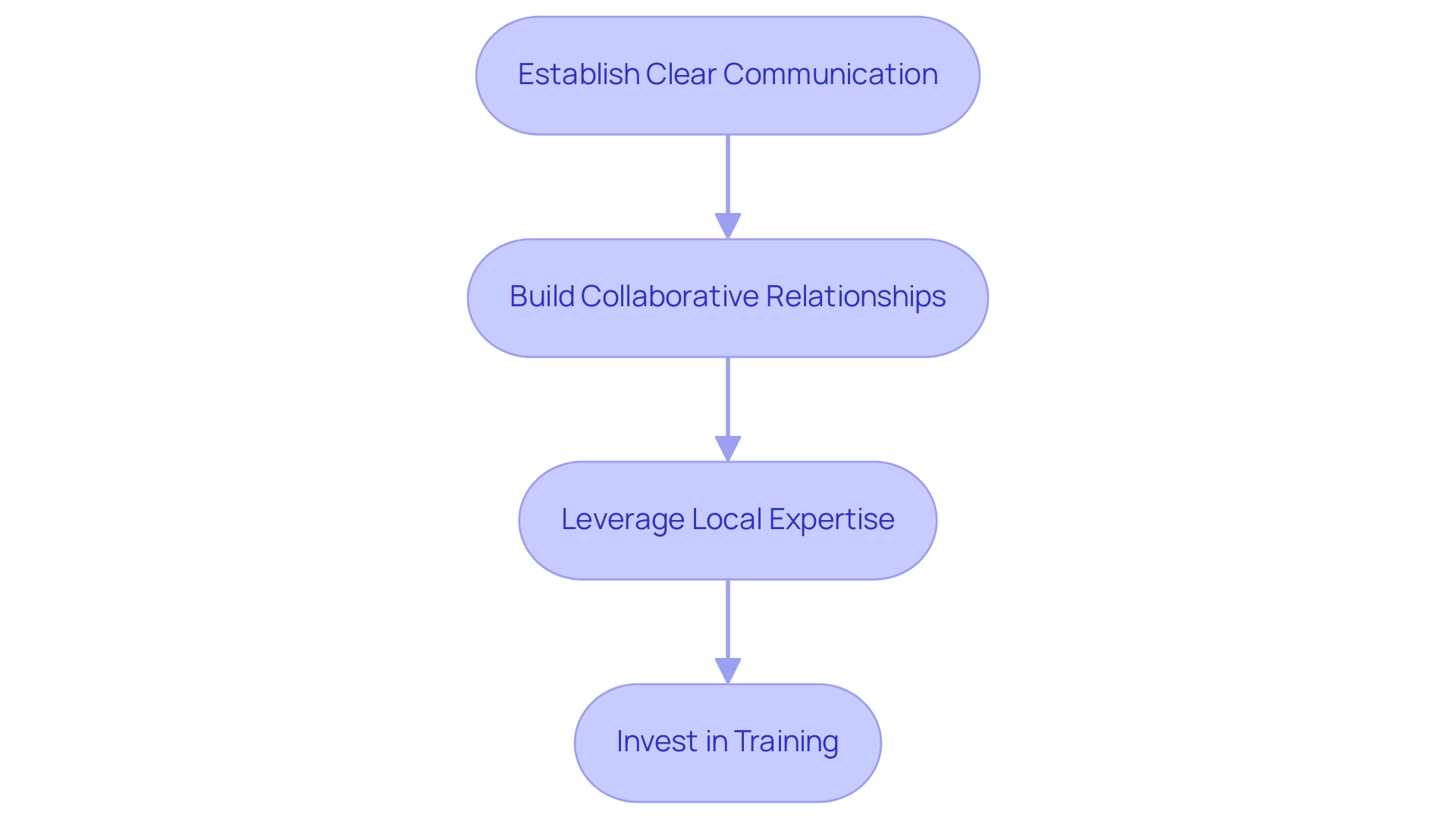
Conclusion
Specialized regional trial services have proven to be indispensable in the complex landscape of clinical research, particularly in Latin America. By addressing the unique challenges posed by regulatory requirements, cultural nuances, and resource limitations, these services enhance the efficiency and effectiveness of clinical trials. Through the strategic integration of local expertise, researchers can significantly improve patient recruitment, streamline compliance processes, and ensure high-quality data management, ultimately leading to better outcomes for patients.
Moreover, the collaboration between specialized service providers and local stakeholders fosters an environment conducive to innovation and growth. Initiatives such as those undertaken by bioaccess™ and Caribbean Health Group illustrate the power of local knowledge in enhancing trial effectiveness and addressing the specific needs of diverse populations. As the field evolves, the importance of understanding regional dynamics and leveraging technological advancements will continue to shape the future of clinical research.
As researchers navigate the complexities of specialized trial services, embracing best practices such as:
- clear communication
- collaborative relationships
- ongoing training
will be vital. By prioritizing these strategies, the clinical research community can optimize trial execution and contribute to advancements in patient care. The journey ahead is filled with opportunities for growth and innovation, underscoring the critical role that specialized regional trial services play in the advancement of medical technology and healthcare outcomes.
Frequently Asked Questions
What are Specialized Regional Trial Services and why are they important?
Specialized Regional Trial Services provide customized solutions for medical research, addressing the unique needs of specific groups and geographic areas. They are particularly vital in Latin America, where challenges such as regulatory hurdles, professionalism issues, language barriers, and fragmented resources exist.
What challenges do Medtech companies face in Latin America?
Medtech companies in Latin America encounter several challenges, including regulatory hurdles, professionalism issues, language barriers, and a lack of established contract research organization (CRO) structures.
How do Specialized Regional Trial Services enhance research outcomes?
These services improve research outcomes by focusing on critical aspects such as patient recruitment, regulatory compliance, and data management, utilizing local knowledge and resources to ensure the relevance and quality of research.
What specific offerings do Specialized Regional Trial Services provide?
Key offerings include patient recruitment and retention strategies, regulatory compliance assistance, trial setup and approvals, bioanalytical services, toxicology assessments, data management and statistical analysis, and project management.
How does local knowledge contribute to the success of medical studies?
Local knowledge allows researchers to understand cultural, social, and economic factors that influence patient behavior, leading to more effective communication strategies and improved recruitment and retention rates.
What role do partnerships play in improving research effectiveness?
Partnerships, such as those between bioaccess™ and local healthcare providers, are crucial for enhancing recruitment processes, ensuring compliance, and facilitating better communication, ultimately leading to faster and more successful research outcomes.
What are the current trends in Specialized Regional Trial Services?
Key trends include increased use of telemedicine, the application of data analytics and AI, a shift towards patient-centric approaches, and the importance of global collaboration in medical research.
What best practices should researchers adopt when engaging with Specialized Regional Trial Services?
Researchers should establish clear communication, build collaborative relationships, leverage local expertise, and invest in training for research personnel to enhance the quality and outcomes of their studies.

